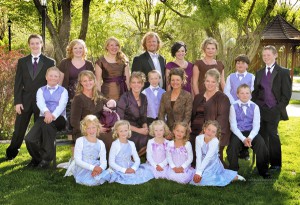Judge Strikes Part of Utah’s Polygamy Ban
Never underestimate the cultural influence of reality TV. The popular show “Sister Wives,” for example, recently led to a significant change in the polygamy laws of Utah.
Sister Wives is about a man, Kody Brown, his four wives, and his 17 children. The Brown family are fundamentalist Mormons who claim polygamy is part of their religion, although the Church of Latter Day Saints formally disavows polygamy today.
 The marital status between the four women and Brown is a little more complicated than it appears at first. Brown only has a marital license with his first wife, Meri. Brown has a common law marriage with Christine and Robyn, both of whom he has been “married” to for 16 years. Brown and his latest wife, Janelle, recently held a marriage ceremony together, but Brown does not hold a marital license with Janelle. Janelle has two children from a prior marriage.
The marital status between the four women and Brown is a little more complicated than it appears at first. Brown only has a marital license with his first wife, Meri. Brown has a common law marriage with Christine and Robyn, both of whom he has been “married” to for 16 years. Brown and his latest wife, Janelle, recently held a marriage ceremony together, but Brown does not hold a marital license with Janelle. Janelle has two children from a prior marriage.
Brown challenged Utah’s polygamy ban in 2011, shortly after “Sister Wives” began broadcasting on the airwaves. Utah, like most states, prohibits individuals from holding more than one marriage license or holding a marital license with more than one person. However, due to the state’s history, Utah goes further than most states by criminalizing “cohabitation” with a person or persons which resembles a marital relationship.
Judge Waddoups, the trial judge presiding over the case and a George Bush appointee, ruled that the cohabitation clause was unconstitutional. Specifically, the judge held that the cohabitation law violated free exercise of religion and invaded the privacy and liberty rights of the Brown family. However, Judge Waddoups left the other half of Utah’s polygamy law untouched. Although it is now legal to live in Utah with a mistress as a spouse, the state won’t recognize more than one spouse.
Should polygamy be recognized by the state if all parties consent to the relationship(s)? Although proponents of same-sex marriage will deny this case has anything to do with their movement, Judge Waddoup’s 91-page decision is a product of the homosexual rights movement. Indeed, Browns’ attorney relied on the Supreme Court case which struck down homosexual sodomy laws when arguing that the cohabitation law should be overturned. Judge Waddoups compared polygamy to “an unmarried man who chooses to have intimate relationships with three women.” Although the state would not sanction the unmarried man’s relationships, the state would not punish the man, or the women, for engaging in such relations.
This is an argument for decriminalizing polygamous lifestyles, but it still is not an argument for recognizing polygamy. State recognition of polygamy will not happen, although social conservatives are still wrong to argue that ‘traditional’ marriage or protection of children is the reason. Unlike same-sex marriage, marriage with multiple partners would require complete renovation of our legal system, especially if polygamous marriages could be recognized as common law marriages. It is easy to replace the word “husband” or “wife” with “spouse.”
For polygamous relations to be recognized by the state, federal tax law, estate law, and spousal communication privileges would all have to change to make room for multiple person marriages. Completely re-engineering our legal system to accommodate polygamy would be challenging, to say the least.


Comments